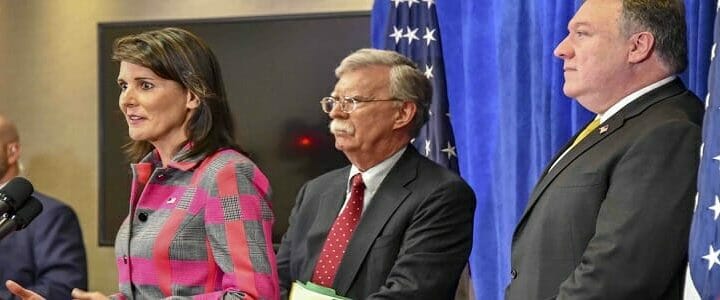Calling it “the Super Bowl of diplomacy,” Secretary of State Mike Pompeo kicked-off his attendance at the 73rd United Nations General Assembly (UNGA) with a press conference alongside U.S. Ambassador to the U.N. Nikki Haley and National Security Adviser John Bolton. The trio previewed President Donald Trump’s Tuesday speech, which will focus on sovereignty. But everyone wanted to know about North Korea.
Pompeo said he expects to visit Pyongyang again before the end of the year to continue work towards the “final, fully verified denuclearization of the DRPK.” He refused to put a date on when Trump and Kim would sit down again, despite Kim’s pressure to have the meeting sooner rater than later.
North korea’s “Irreversible commitment to denuclearization”
While he praised the progress South Korean President Moon and Kim made last week, Pompeo reiterated the president’s (or perhaps more accurately, his administration’s) belief that “now is the not the time to ease pressure” on the Hermit Kingdom. One often gets the impression that Trump would give away the farm in order to make a historic impact. And then like they’ve done in the past, North Korea would quickly renege.
But despite a lack of concrete advances, not all the news is disheartening. South Korean President Moon Jae-in is also in New York for the UNGA, after his visit last week to Pyongyang and other points north of the 38th parallel. Three hours after Pompeo’s presser, Moon met with Trump in a bilateral meeting, speaking to the press before getting down to business.
While in North Korea, Moon apparently heard what others did not, claiming that “Chairman Kim personally expressed his commitment to denuclearization in front of the world media,” and that “North Korea’s decision to relinquish its nuclear program has been officialized to a degree that not even those within North Korea can reverse.”
No one has yet said what Kim meant by the “corresponding measures” required of the U.S. to proceed on the path to denuclearization, but they are hopefully spelled-out in the letter from Kim that Moon delivered to Trump today.
Renegotiated trade deal could be a boon for U.S. auto industry
Somewhat lost in the news of the day was the fact that Trump and Moon signed what Trump called “a very important trade agreement.” This in itself is interesting, since one of the more salacious details from journalist Bob Woodward’s book on the administration, Fear, recounted a scene where former presidential adviser Gary Cohn allegedly stole a memo off the president’s desk that would have withdrawn the U.S. from the Korea Free Trade Agreement, known as KORUS.
Trump called the new agreement “a long time in coming,” and “a basic redoing” of KORUS, which he called “a very unfair agreement for the United States.” According to the White House, since KORUS went into effect, the U.S. trade deficit with Korea, the difference between the exports and imports, has increased from $6.3 billion in 2012 to $9.8 billion in 2017. The new agreement will “level the playing field,” particularly in the area of automobiles.
In a boost for Detroit, South Korea will double—from 25,000 to 50,000—the number of cars it allows to enter the country using U.S. safety standards “without further modification.” Despite strict U.S. standards, Korea has required modifications that would cost millions of dollars annually were GM, Ford, or Chrysler to exceed their import quotas. As of a Reuters report last year, none of the three U.S. car companies had reached the 25,000-car threshold; hopefully, giving them the ability to ship twice as many cars will give them the incentive to market more aggressively.
There’s lots more to come this week. In addition to the Moon meeting and a large meeting on counternarcotics policy, Trump will give his speech to the UNGA, attending numerous bilateral talks with world leaders, and will participate in a U.N. Security Council (UNSC) meeting. Pompeo will attend a UNSC meeting as well.
All while Iranian President Hassan Rouhani stalks the sidelines and Iranian Foreign Minister Javad Zarif tries not to be seen talking to John Kerry.




